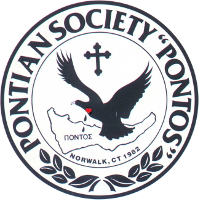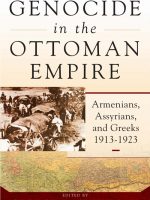The Asia Minor and Pontos Hellenic Research Center is pleased to announce a new book, Genocide in the Ottoman Empire: Armenians, Assyrians, and Greeks, 1913-1923. Edited by George N. Shirinian. New York and Oxford: Berghahn Books, 2017. 433 pages.
The final years of the Ottoman Empire were catastrophic for its non-Turkish, non-Muslim minorities. From 1913 to 1923, its rulers deported, killed, or otherwise persecuted staggering numbers of men, women and children in an attempt to preserve “Turkey for the Turks,” setting a modern precedent for how a regime can commit genocide against its own citizens in pursuit of political ends, while largely escaping accountability. While this brutal history is most widely known in the case of the Armenian Genocide, few today appreciate the extent to which the fate of the Empire’s Assyrian and Greek subjects was intertwined with that of the Armenians. The US Ambassador to the Ottoman Empire, Henry Morgenthau, stated that
The Armenians are not the only subject people in Turkey which have suffered from this policy of making Turkey exclusively the country of the Turks. The story which I have told about the Armenians I could also tell with certain modifications about the Greeks and the Syrians. Indeed, the Greeks were the first victims of this nationalizing idea … In fact, Bedri Bey, the Prefect of Police at Constantinople, himself told one of my secretaries that the Turks had expelled the Greeks so successfully that they had decided to apply the same method to all the other races in the empire.
One of the chapters examines the legal basis for treating the partial destruction of a group by deportation as genocide and concludes that there is important evidence of genocidal intent to be found in the strains of extremist ideology that emerged in the Ottoman Empire during the last quarter of the nineteenth century and first quarter of the twentieth century. This is especially relevant today, with the extermination and depopulation of Assyrians and Yezidis in the Middle East resurfacing through the extremist ideology and actions of the Islamic State since 2014. Studying the genocides of the Ottoman Empire can help us better contextualize and understand contemporary identity-based violence in the region today, and hopefully offer insights into how to recognizeand prevent current or future crimes against humanity.
This comprehensive volume is the first to broadly examine the genocides of the Armenians, Assyrians, and Greeks in a holistic manner,providing detailed descriptions, careful analysis, and essential context. Five of the studies in this collection are comparative in nature.The text is rich in quotations of original source material and fully annotated. It includes previously unpublished photographs and documents. The contents and contributors are listed below.
This book has its origins in the “International Conference on the Ottoman Turkish Genocides of Anatolian Christians,” held at the Illinois Holocaust Museum and Education Center in May 2013, co-organized by the Asia Minor and Pontos Hellenic Research Center, the Armenian National Committee, and the Assyrian Center for Genocide Studies. It is the latest in a series of activities that are part of the long-term effort of the AMPHRC to promote the study of the larger pattern of genocide in the late Ottoman Empire and early Turkish Republic and to raise awareness of it.
The AMPHRC is a not-for-profit, 501(c)(3) organization established in January 2011. The Center’s goal—unique in its kind—is to document and raise awareness of the “Great Catastrophe” that resulted in the uprooting and destruction of the Greek communities in their homelands of Asia Minor, Pontos, and Eastern Thrace in the early decades of the twentieth century after a 3,000-year-long presence there.
This is a “must-have” book for those with an interest in Armenian, Assyrian or Greek History;Late Ottoman and Turkish Republican History; the History of the Modern Middle East; Genocide and Comparative Genocide Studies; Political Science;and Sociology.
George N. Shirinian is Executive Director of the International Institute for Genocide and Human Rights Studies (A Division of the Zoryan Institute). His book publications include Studies in Comparative Genocide(Macmillan 1999) and The Asia Minor Catastrophe and the Ottoman Greek Genocide: Essays on Asia Minor, Pontos, and Eastern Thrace, 1913–1923 (Asia Minor and Pontos Hellenic Research Center 2012). His articles include “Turks Who Saved Armenians: Righteous Muslims During the Armenian Genocide,” and “Starvation and its Political Use in the Armenian Genocide” (forthcoming). The 14 contributors represent specialists on Armenian, Assyrian and Greek history, Genocide Studies, and International Criminal Law. They conduct research and teach in Armenia, Australia, Greece, and the United States.
For more info about the book click here

